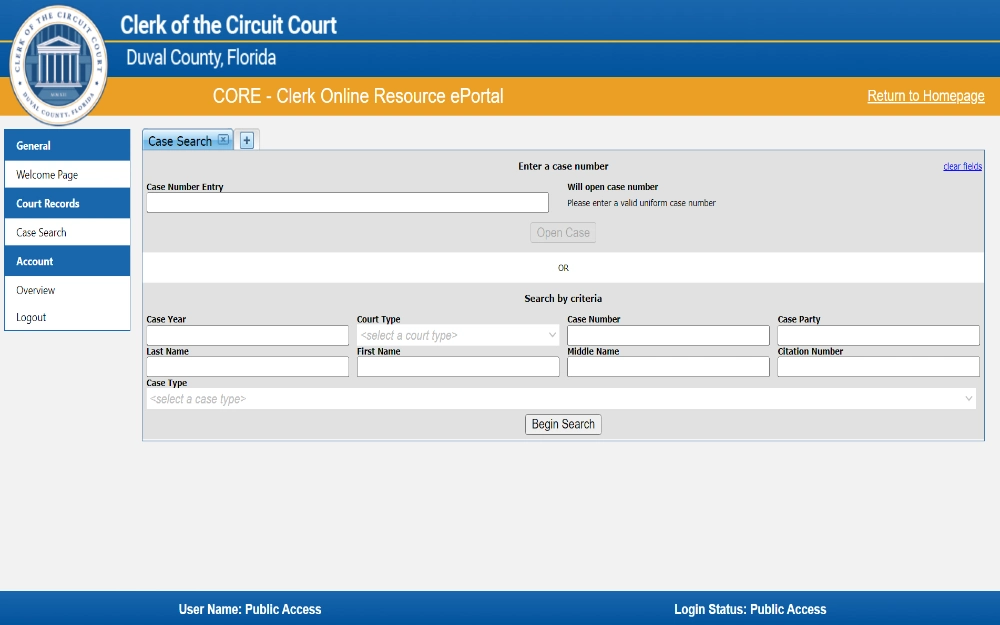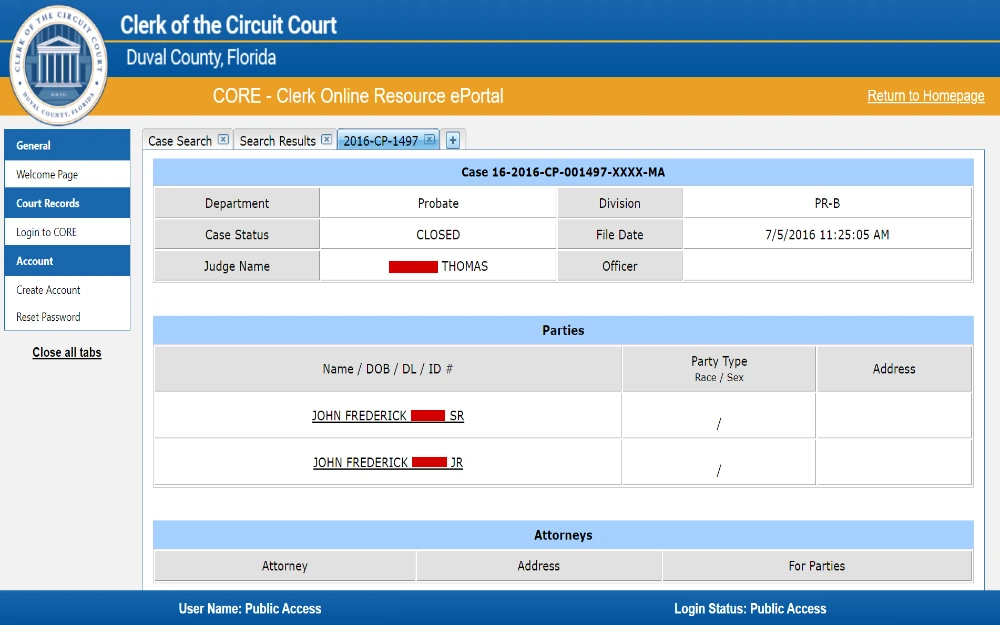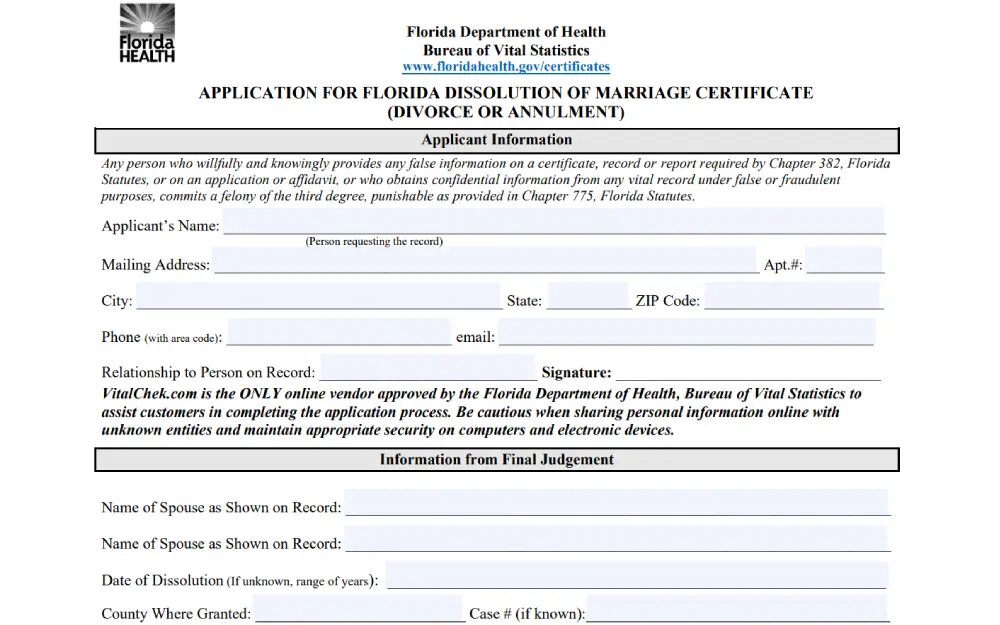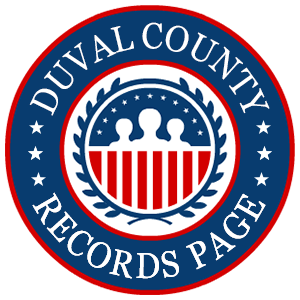Find Duval County divorce records without having to pay a search fee via state and county public record custodians.
County courts process requests for dissolutions of marriages in Duval County, Florida, and keep records of such inquiries. Searching for divorce papers can be time-consuming, but this article streamlines the process by clearly outlining the steps to take and providing aggregate links to databases that host this information.
Check out this resource for official options for locating divorce records in Duval County and across the state of Florida.
How To Look Up Duval County Divorce Records for Free
Divorce records for Duval County can be found by searching court records. Divorces in Duval County are processed by the Fourth Judicial Circuit Courts of Florida.1
In accordance with Rule 2.420 of the Florida Rules of Judicial Administration, private individuals may request access to judicial branch records held by the Fourth Judicial Circuit. These records are made available to the public for responsible personal use only.
Uncertified copies of Duval County court records from 1988 onwards are accessible via the Clerk Online Resource ePortal (CORE).2 Curious parties can view limited information via CORE without creating an account.
To search CORE, select the Public Access option, then enter any details known about the case, such as:
- Case Number
- Case Year
- First, Last or Middle Name of one of the involved parties
- Case Type

Divorce records are divided into three categories:
- Dissolution of Marriage
- Dissolution of Marriage: Annulment
- Dissolution of Marriage: Simplified
Provide as many details as possible to narrow down the search, then click the ‘Search’ button.
The results page shows a list of matching cases and names of relevant parties. Clicking on one of the names opens up a tab with detailed results, including case status, dates and a list of available documents.

To view uncertified court documents, users must register for an account with CORE or contact the clerk of court.
Make any requests for certified copies of court documents in writing. Mail them to:
Duval County Courthouse
501 West Adams Street, Suite 7212
Jacksonville, Florida 32202
Phone: 904-255-2025
It’s also possible to make a request in person by visiting room 1253 of the Duval County Courthouse, which is open Monday through Friday between 8 a.m. and 5 p.m.
Alternatively, inquiries can be made by email to the court counsel at: [email protected]
The request must contain sufficient information to enable the clerk to identify the records. However, there’s no need to disclose the reason for the request.
Searchers should provide contact details so the clerk can reply to the request. Including an email address helps ensure prompt fulfillment because it gives the clerk a convenient way to request more information and narrow down the requested records.
There’s a nominal fee for certified copies of court records. It’s currently set at:
- $1.00 per page plus
- $2.00 per instrument
The clerk informs searchers of their request’s total cost, and payment must be made before delivery. Use the following methods:
- Cash
- Money order
- Cashier’s check
- Certified check
- Credit or debit cards
A non-refundable service fee of 3.5% is added to all credit or debit card payments. Personal checks are not accepted.
Access Divorce or Dissolution of Marriage Information via Cities Within Duval County (No Fees)
The county court processes divorce cases in Duval County, which is divided into the following areas:
- Jacksonville
- Jacksonville Beach
- Atlantic Beach
- Neptune Beach
- Baldwin Town
Each location is covered by the Duval County Courthouse, and divorce proceedings are overseen by the court’s Family Court Services.3 To obtain information about divorce decrees or access court papers, contact the clerk of court using the information listed in the section above.
The Family Court Services Department can be contacted at the following address:
Family Court Services
501 West Adams St., Room 2150
Jacksonville, FL 322202
Phone: 940-255-1060
Requests can be made via email to: [email protected] or via the Clerk Online Resource ePortal (CORE).
Anyone can use court records as a de facto divorce index to find out if a divorce took place for free. However, only authorized individuals can download a certified divorce certificate, and there’s a nominal fee for receiving certified documents.
How To Find Divorce Records in All of Florida Through the State Bureau of Vital Statistics
Divorce records from 1927 onwards can be accessed through the Florida Bureau of Vital Statistics.4
After a divorce or annulment is recorded with the Clerk of the Circuit Court, the report is passed to the Bureau of Vital Statistics for filing. This process can take up to 60 days.
Searchers can download a divorce record request form for marriage record information online, then post it to the bureau along with payment for the records:5
Florida Department of Health
Bureau of Vital Statistics
ATTN: Vital Records Section
P.O. Box 210
Jacksonville, Florida 3223-0042
Alternatively, a walk-in service is available at the following address:
Florida Department of Health
Bureau of Vital Statistics
1217 North Pearl Street,
Jacksonville, Florida, 32202
Phone: 904-359-6900
Email: [email protected]
Opening hours: 8 a.m. to 4.30 p.m.

The average processing time for computer certificates issued after 1970 is 3 to 5 business days. There’s a nominal fee of $5 per certificate and a $10 rush fee for same-day orders and requests for documents from 1927 to 1970. Payments are made via check or money order, and any fees are non-refundable, except fees paid for additional copies of documents if no matching record was found.
If the year of the divorce is unknown, searchers can provide a date range, and there is a fee of $2 per year searched, up to a maximum of $50.
Those looking for information about a divorce that took place before 1927 can contact the Florida Clerk of Circuit Court for the county in which the divorce was granted. To source a list of court clerks, visit the Florida Court Clerks & Comptrollers website home page and click on the dropdown list marked “Find a Clerk”.
It’s also possible to contact the Clerk of Circuit Court for a given county to request information about a divorce that took place within the last 60 days. This may be necessary if a recent divorcee requires immediate evidence about the divorce.
Note that common-law marriages aren’t recognized in Florida, so there’s no concept of common-law divorce. A couple could live together for several years and be perceived by those around them to be married, but they won’t have the same rights as a married couple while they’re together. Likewise, they wouldn’t have the same right to fair division of property in case of a breakup.
Searchers can also request information about divorce records in Florida via VitalChek. In addition to using the VitalChek website, users can also contact the service via:
Phone: 1-877-550-7330
Fax: 1-877-550-7428
This national-level service charges a higher processing fee than the Bureau of Vital Statistics. Plus, VitalChek may not be able to provide rush processing services for recent divorces. Nonetheless, the service accepts credit card payments.
Who Is Able to View & Acquire Divorce Records in Duval County Florida?
Divorce records are a matter of public record in Duval County, per Florida Statute 119.01.6 However, only authorized individuals can request certified copies of divorce decrees. These are more detailed divorce papers that contain more specific information, so they are typically not available to the general public
Because marriage and divorce records are a matter of public record, there’s no requirement for proof of identity. Nor are searchers required to provide a reason for their search. Those researching their family trees and looking for older divorce information may find third-party genealogy sites, however, these sites are useful for general research only and the information provided by them can’t be used for official purposes.
This article covered all the ways to access Duval County divorce records and request certified copies of court documents; with access to this publicly available information, anyone is capable of obtaining their desired information.
References
1Fourth Judicial Circuit Court of Florida. (n.d.). Family Court Services. Retrieved March 22, 2024, from <https://www.jud4.org/Family-Court-Services-(Self-Help).aspx>
2Duval County Clerk of Courts. (2024). CORE – Clerk Online Resource ePortal. Retrieved March 22, 2024, from <https://core.duvalclerk.com/>
3Duval County Clerk of Courts. (n.d.). Family Law. Retrieved March 22, 2024, from <https://www.duvalclerk.com/departments/civil-court-services/family-law>
4Florida Department of Health. (2024, February 28). Divorce. Retrieved March 22, 2024, from <https://www.floridahealth.gov/certificates/certificates/divorce/index.html>
5Florida Department of Health. (2023, June 30). Application for Florida Dissolution of Marriage Certificate. Retrieved March 22, 2024, from <https://www.floridahealth.gov/certificates/certificates/marriage/_documents/DH260-diss-marr-app-6-30-2023.pdf>
6The Florida Legislature. (2023). Public Officers, Employees, and Records. Retrieved March 22, 2024, from <http://www.leg.state.fl.us/Statutes/index.cfm?App_mode=Display_Statute&Search_String=&URL=0100-0199/0119/Sections/0119.01.html>
